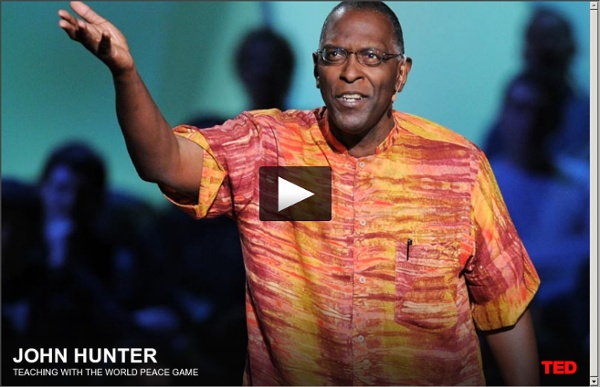



http://www.ted.com/talks/john_hunter_on_the_world_peace_game.html
BigGames The last few years have seen the blossoming of real world computer games that allow players to learn about important global issues. Here are a bunch of them. (If you know of others, please let us know so we can post them.) Real Lives is a unique, interactive life sim that enables you to live one of billions of lives in any country in the world. Through statistically accurate events, Real Lives brings to life different cultures, political systems, economic opportunities, personal decisions, health issues, family issues, schooling, jobs, religions, geography, war, peace, and more!
Presentations Introduction Gamification has many ever-changing components to it, from psychology to design and implementation. Here are a few external resources we have vetted and compiled to help supplement your knowledge on the subject. Game mechanics for causes – Catalysts for Change – Evolution of Philanthropy Nothing is more captivating than a well-thought out game. That’s why more and more initiatives are building games (or using game mechanics) to create positive social change. Here’s a new one that launched today – it’s called Catalysts for Change, and it gives players a game-like competition for sharing and responding to ideas about solving the world’s social problems. It’s a bit like Quora meets Twitter meets Trivial Pursuit. Here’s a video they put together that provides a brief overview: One you sign up, you’re asked to submit “cards”, which are basically suggestions or responses to specific issues.
Gamification About the Course Gamification is the application of digital game design techniques to non-game contexts, such as business, education, and social impact challenges. Video games are the dominant entertainment form of modern times because they powerfully motivate behavior. Game mechanics can be applied outside the immersive environments of games themselves, to create engaging experiences as well as assign rewards and recognition. Over the past few years, gamification adoption has skyrocketed.
The Playpump: How a Simple Gamification Concept can Save the (third) World New to Gamification? Check out my post What is Gamification & my Gamification Framework: Octalysis Gamification visits the Third World Most of the time, we think of Gamification as a technique to get consumers to like our products more, to be more productive in life, and improve our workplace, but Gamification can sometimes be used to save an entire nation.
Gamification Categorization[edit] Gamification in a narrow sense is used in a non-game context, is built into the service system, and is aiming at an infinite experience. It does not aim at creating a game but offering a gameful experience. Can Open Government Be Gamed? If information is power, the first step to gaining power is to get the right data. The Obama administration is a big proponent of opening up government data and making it digitally available. Today at the Personal Democracy Forum in New York City, the government’s new chief information officer Vivek Kundra announced USAspending.gov, a new site which launched today that tracks government spending with charts and lists ranking the largest government contractors (Lockheed, Boeing, Northrop Grumman, etc.) and assistance recipients (Department of Healthcare Services, New York State Dept. of Health, Texas Health & Human Services Commission, etc.). There is also the Data.gov project, which is attempting to digitize government data and make it available in its raw form for citizens and companies to sift through. Digital tools are bringing participation back to democracy, or at least that is the idea.
A research perspective on gamification: HP Labs Feature Article (August 2012) HP Fellow Charlie Bess There's a lot to be said for the idea that everything in life is a game, that someone is always keeping score, and that everyone is always being measured somehow, whether we like it or not. Gamification takes these concepts of engagement, behaviors and measurement into the business setting in ways that can enable organizations to meet their objectives.
Introducing a Game-Based Curriculum in Higher Ed Continuing from last week’s post about “The Gamification of Education”, this week we bring you a guest post from Justin Marquis, who examines the why’s and how’s of incorporating game based learning elements into the higher education curriculum. The gamification movement is in full-effect with its fair share of proponents and opponents. Those in favor of the idea most often cite student motivation and the ability of games to simulate real world circumstances so that learners can safely explore these environments without endangering themselves or others. Those on the other side of the argument think gamification is just a fad and that there is no real transfer of what is learned in games to the real world.
The gamification brain trust: 6 experts on why game elements are critical in our work and social lives Gamification, or the use of gameplay mechanics to make nongame activities more fun and engaging, has taken off in a big way. Multiple gamification companies made appearances at Salesforce.com’s DreamForce 2012 conference this week with apps that gamify sales via leaderboards and rewards. Gamification resembles the old airline loyalty programs, but now companies can access much more data and feedback from users that can make gamification more scientific and effective.
Inspiring video demonstrating the value in pupil lead learning and how teaching doesn’t always need to be didactic. by adamkeane Nov 14